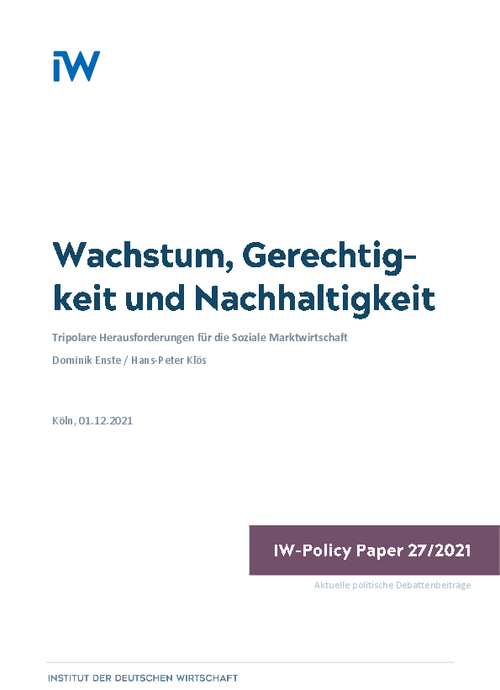In the last two decades, a debate has unfolded around the relationship between growth and well-being that has produced numerous new concepts, indicators and sets of targets. This increasingly includes an emphasis on sustainability concepts.

Growth, Equity and Sustainability: Tripolar Challenges for the Social Market Economy

In the last two decades, a debate has unfolded around the relationship between growth and well-being that has produced numerous new concepts, indicators and sets of targets. This increasingly includes an emphasis on sustainability concepts.
This development is also reinforced by the clear desire in the population for more climate protection and sustainability, which is joined by questions about the meaningfulness of growth. The shifts in preferences among the population go hand in hand with changes in the milieus and have also led to a change in electoral behaviour and a new government coalition. In a stylized triangulation of the three brand cores of a “traffic light”-coalition - namely justice (SPD), sustainability (Greens) and growth (FDP) – it is shown how different ideas of justice are reflected in different concepts of growth and prosperity and which options for sustainable growth through a market-based policy can be derived from this.
Based on international comparative data, it is shown that the German economic model of the "Social Market Economy" offers a good starting position for successfully mastering the structural change towards a more resource-efficient production: In an international comparison of the 17 Sustainable Development Goals (SDGs) of the United Nations for 164 countries, Germany ranks fourth in terms of achieving the goals of justice and sustainability and has even improved further on a high level for 15 of the 17 goals. There is a positive correlation between social justice and a liberal regulatory framework. Moreover, prosperity and social justice tend to go hand in hand: With the exception of the USA, countries that have a high level of material prosperity also offer more social security and justice. In this respect, too, Germany has made the greatest progress of all the countries compared.
Growth, equity and sustainability can reinforce each other within a regulatory, institutional framework and thus improve the quality of growth. The more reliable a regulatory framework is, the better prosperity and sustainability can be secured. Through a higher pricing of environmental goods and an investment effort, it can be possible to secure the value-added basis of the German economy and also achieve the other SDGs. This will require prioritisation and de-prioritisation of government action. Prioritisation includes ensuring fiscal sustainability on the one hand and ecological sustainability on the other. For both goals, the creation of a level playing field in the market economy, the securing of a balance between the three pillars of sustainability as well as the setting and use of market-based incentives and green nudging are important success factors.

Growth, Equity and Sustainability: Tripolar Challenges for the Social Market Economy

More on the topic

Leadership in transformation: Megatrends and management as a driver of change
Leadership dynamics in companies are subject to constant change in order to meet the challenges of their time. Today, the greatest influences result from developments such as demographic change, globalization, individualization, structural change and ...
IW
Green Nudging – a key against littering?
The demand for cleanliness in cities is increasing: "Littering" - the illegal littering of public spaces - does not only cause costs for the environment and society, but also has significant financial consequences through increased cleaning costs.
IW